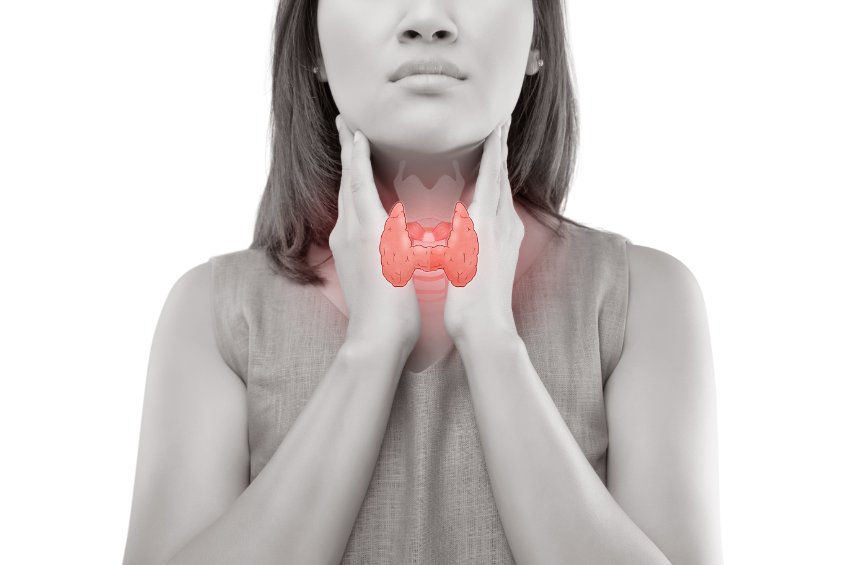Hypothyroidism is a condition where the thyroid gland produces insufficient amounts of thyroid hormone. This can significantly impact an individual’s health and quality of life as thyroid hormone affects many functions in the body. Common symptoms include fatigue, weight gain, depression, and sensitivity to cold. Thankfully, hypothyroidism is a manageable condition with proper medication treatment. Levothyroxine is the drug that is the cornerstone of therapy. This blog post will explore levothyroxine for treating hypothyroidism, how it works, and considerations for use.
See our blog – Understanding the Thyroid
What is Hypothyroidism?
The thyroid gland, located in the front of the neck, plays a crucial role in regulating metabolism, growth, and development by producing thyroid hormones, primarily thyroxine (T4) and triiodothyronine (T3). Hypothyroidism occurs when the thyroid gland is underactive, leading to insufficient production of these hormones. Some causes of hypothyroidism include autoimmune diseases like Hashimoto’s disease, surgical removal of the thyroid, radiation therapy, and thyroiditis (inflammation of the thyroid gland).
What is Levothyroxine?
Levothyroxine is a synthetic form of the thyroid hormone thyroxine (T4). It is very commonly prescribed for hypothyroidism and is available under various brand names such as Synthroid, Levoxyl, and Euthyrox, as well as in generic forms. Levothyroxine effectively replaces the deficient thyroid hormone, helping to restore normal metabolic function and alleviate the symptoms of hypothyroidism.
How Levothyroxine Works:
Levothyroxine works by mimicking the natural hormone thyroxine (T4) produced by the thyroid gland. Once administered, levothyroxine is converted into the more active form, triiodothyronine (T3), in the body. T3 exerts its action in the body to regulate metabolic processes. This hormone replacement therapy helps to restore normal thyroid hormone levels, thereby alleviating the symptoms associated with hypothyroidism.
Considerations for Use:
- Individualized Dosing: Determining the correct dosage of levothyroxine is crucial for effective treatment and avoiding side effects. The initial dose of levothyroxine is typically based on patient-specific factors such as age, weight, severity of hypothyroidism, and presence of other medical conditions. Regular monitoring of TSH levels helps to adjust the dosage to achieve optimal thyroid function.
- Consistent Administration: Levothyroxine should be taken on an empty stomach 30 minutes to 1 hour before breakfast. If choosing to take it at bedtime rather than in the morning, take three hours or longer after the last evening meal.
- Interactions: Certain foods, supplements, and medications can interfere with the absorption of levothyroxine. Patients should avoid intake of calcium and iron supplements and antacids within four hours of levothyroxine administration.
- Potential Side Effects: While levothyroxine is generally well-tolerated, it can cause side effects, particularly if the dose is too high or too low. Common side effects may include:
- Over-treatment: Excessive doses of levothyroxine can lead to symptoms of hyperthyroidism, such as rapid heart rate, anxiety, insomnia, and weight loss.
- Under-treatment: Insufficient dosing may result in persistent symptoms of hypothyroidism, such as fatigue, weight gain, and depression.
Conclusion:
Levothyroxine remains the gold standard medication in treating hypothyroidism. It offers an effective and reliable means of restoring normal thyroid hormone levels to alleviate symptoms of hypothyroidism. Working closely with healthcare providers to monitor and adjust treatment as needed is important in achieving optimal results with levothyroxine treatment.
Resources:
1) https://dailymed.nlm.nih.gov/dailymed/drugInfo.cfm?setid=6279390b-ee61-4ef9-ac15-25537ca783c1
2) Eghtedari B, Correa R. Levothyroxine. [Updated 2023 Aug 28]. In: StatPearls [Internet]. Treasure Island (FL): StatPearls Publishing; 2024 Jan-. Available from: https://www.ncbi.nlm.nih.gov/books/NBK539808/
3) https://www.niddk.nih.gov/health-information/endocrine-diseases/hypothyroidism#causes












